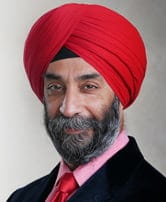
Thought Leadership
Three Ways for Companies to Avoid Becoming Too Complex
The KISS principle (“Keep it simple, stupid) was coined by the U.S. Navy as a design rule in 1960, and it’s since proven its worth when applied to everything from politics to business. That doesn’t mean it’s easy to stick to, however, and when executives fail to achieve that goal, it can make for big headaches.
Kellogg Prof. Mohan Sawhney, who teaches the right way for companies to upsize as co-Academic Director of the Executive Education program Delivering Business Growth: an Actionable Framework, sees plenty of examples of complexity run amok in today’s business landscape. “It’s having too many product lines or factory locations, serving too many customer segments, and being in too many markets,” he said. “For instance, if you look at the Samsung Galaxy product line, they were going to slash thirty percent of their products. Procter & Gamble decided to kill half of their brands a few years ago. Now G.E. is looking at splitting up its businesses into multiple parts and getting rid of some of them because it’s become too complex.”
Companies don’t become bogged down in complexity on purpose, Sawhney noted. The main culprit is usually one of three problems.
- Silos: “Every product manager has a reason for creating their product, but they don’t look sideways at other products to see what might be shared in terms of supply chain. There are overlapping products. People aren’t looking at the big picture. Each product makes sense, but the total doesn’t add up.”
- Short-term investor focus: “You’re not going to make your numbers, and your top line isn’t where it needs to be, so teams will buy their way into it. One company I worked with proposed a $20-million acquisition to make the top line look good. You’re buying revenues, but the management bandwidth required to integrate those acquisitions is much more than the revenues you’ve acquired.”
- The belief that all growth and all customers are good: “When you start acquiring less profitable customers or even losing money on them, it looks like revenues are going up in the aggregate. But you’re bringing in customers who are marginal and losing you money. A lot of companies are 120-to-20, meaning that 120 percent of profits come from only 20 percent of customers. Revenues don’t tell the story. Profits do.”
Of course, that doesn’t mean selling a loss in short-term numbers to shareholders is easy. But Sawhney compares organic growth to organic food. “It’s harder to grow, but it tastes better and does you good,” he said. “My message to a CEO would be to mine your backyard and make sure you go deeper into the market you already serve, building greater strength and doing logical and adjacent expansions from your core business. It’s not that all acquisitions are bad. You can acquire with a focus in mind.”
Speaking of leadership, complexity issues also arise when short-term executives make moves without worrying about long-term effects. “The average tenure of a CEO is shrinking,” Sawhney noted. “So you can do window dressing and make the company look good while you’re hollowing it out. It’s good-news theater. When your tenure is short, you make sure you get out at five minutes to midnight before you turn into a pumpkin. We see a lot of that happening.”
So who’s successfully keeping a lid on their complexity? Exhibit A is for Apple, according to Sawhney. “They only make five products. With the iPhone, they only have two or three SKUs. They don’t have hundreds and hundreds of variants. The iPhone is about 65 percent of their revenue.”
All of which, appropriately enough, is easily summarized in one short observation. “There is a lot to say for simplicity,” said Sawhney.
 |
Prof. Mohan Sawhney teaches in a variety of Kellogg Executive Education programs, including Leading and Sustaining a Culture of Innovation , Kellogg on Branding and Leading Into the Future. He has written seven management books as well as dozens of influential articles in leading academic journals and managerial publications. In addition, Prof. Sawhney has won several awards for his teaching and research and advises and speaks to Global 2000 firms and governments worldwide. He holds a Ph.D. in Marketing from the Wharton School of the University of Pennsylvania; and a Master’s degree in Management from the Indian Institute of Management, Calcutta. |
Delivering Business Growth
Emphasizing action, this program teaches a market-tested framework that has delivered sustained double-digit growth in revenues and margins for major global brands. You’ll leave with a business growth strategy and actionable agenda for driving growth within your organization.
Upcoming Sessions
|
June 15-18, 2026 Start: June 15 at 1:00 PM End: June 18 at 11:45 AM
A preferred hotel rate is available at the Omni Chicago. |
$9,950 Fee does not include accommodations. |
|
|
October 26-29, 2026 Start: October 26 at 1:00 PM End: October 29 at 11:45 AM
A preferred hotel rate is available at the Hyatt Coral Gables (use code 60167). |
$9,950 Fee does not include accommodations. |



